Ethical Standards and Audit Quality: An In-depth Analysis
VerifiedAdded on 2020/05/16
|8
|1759
|147
AI Summary
The document provides a comprehensive analysis of various scenarios in auditing where ethical standards and audit quality are pivotal. It discusses how adherence to APES 110 influences auditor decisions regarding qualified, adverse, or unqualified reports based on issues like management's disclosure practices, internal control weaknesses, compliance with accounting standards, and concerns about going concern status. The assignment references scholarly articles that support the relationship between audit evidence documentation, firm tenure, and the issuance of different types of audit opinions. By synthesizing these elements, it offers insights into maintaining high-quality audits through ethical practice adherence.
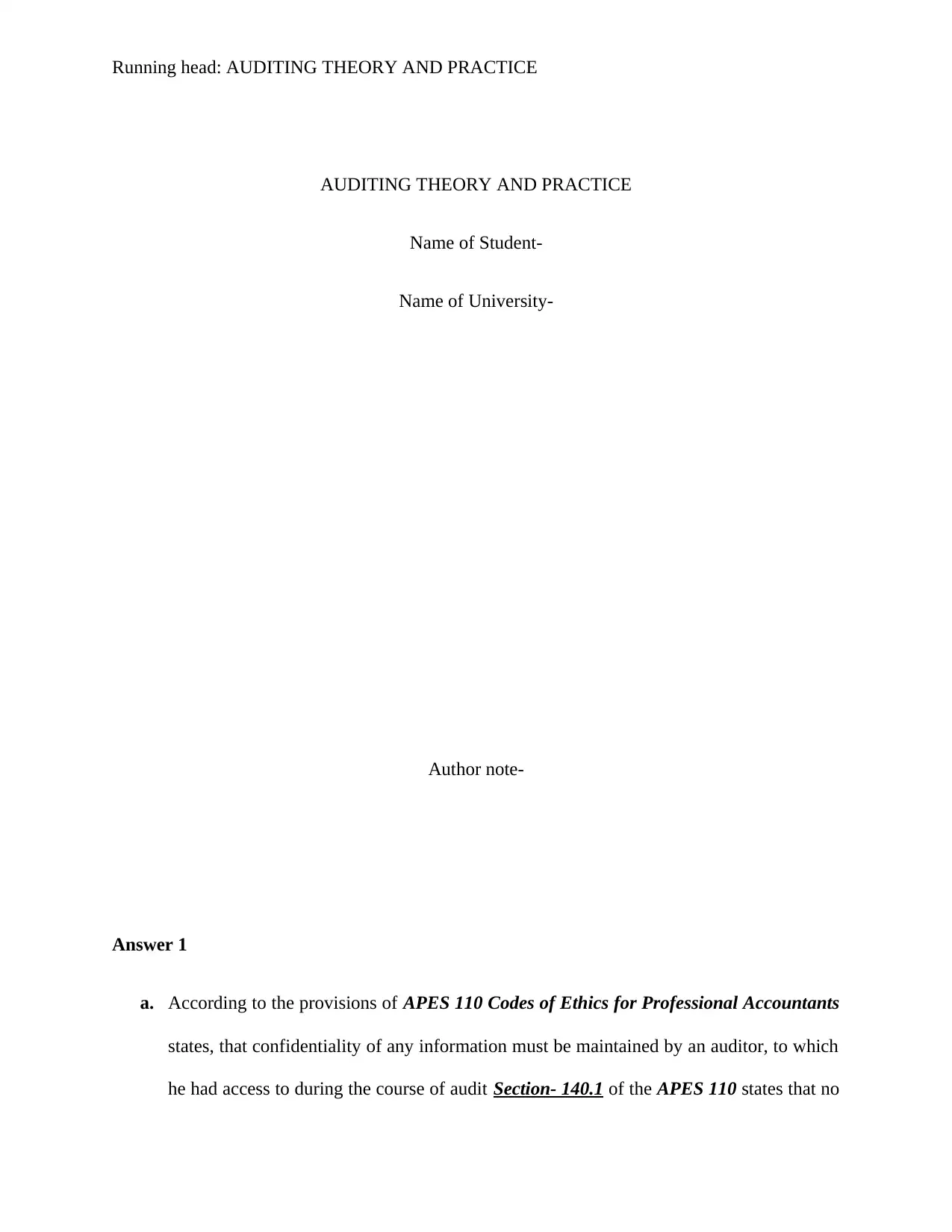
Running head: AUDITING THEORY AND PRACTICE
AUDITING THEORY AND PRACTICE
Name of Student-
Name of University-
Author note-
Answer 1
a. According to the provisions of APES 110 Codes of Ethics for Professional Accountants
states, that confidentiality of any information must be maintained by an auditor, to which
he had access to during the course of audit Section- 140.1 of the APES 110 states that no
AUDITING THEORY AND PRACTICE
Name of Student-
Name of University-
Author note-
Answer 1
a. According to the provisions of APES 110 Codes of Ethics for Professional Accountants
states, that confidentiality of any information must be maintained by an auditor, to which
he had access to during the course of audit Section- 140.1 of the APES 110 states that no
Paraphrase This Document
Need a fresh take? Get an instant paraphrase of this document with our AI Paraphraser
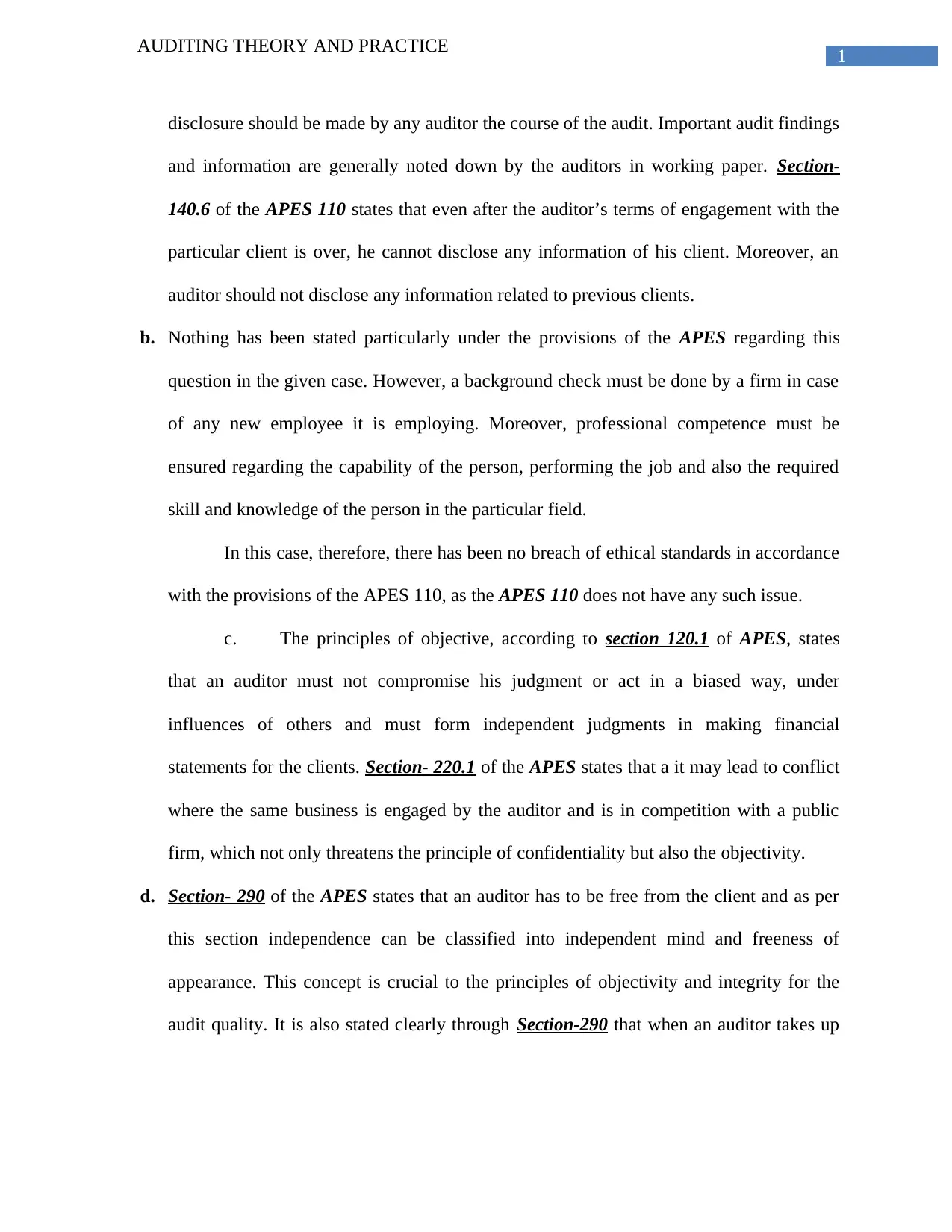
1
AUDITING THEORY AND PRACTICE
disclosure should be made by any auditor the course of the audit. Important audit findings
and information are generally noted down by the auditors in working paper. Section-
140.6 of the APES 110 states that even after the auditor’s terms of engagement with the
particular client is over, he cannot disclose any information of his client. Moreover, an
auditor should not disclose any information related to previous clients.
b. Nothing has been stated particularly under the provisions of the APES regarding this
question in the given case. However, a background check must be done by a firm in case
of any new employee it is employing. Moreover, professional competence must be
ensured regarding the capability of the person, performing the job and also the required
skill and knowledge of the person in the particular field.
In this case, therefore, there has been no breach of ethical standards in accordance
with the provisions of the APES 110, as the APES 110 does not have any such issue.
c. The principles of objective, according to section 120.1 of APES, states
that an auditor must not compromise his judgment or act in a biased way, under
influences of others and must form independent judgments in making financial
statements for the clients. Section- 220.1 of the APES states that a it may lead to conflict
where the same business is engaged by the auditor and is in competition with a public
firm, which not only threatens the principle of confidentiality but also the objectivity.
d. Section- 290 of the APES states that an auditor has to be free from the client and as per
this section independence can be classified into independent mind and freeness of
appearance. This concept is crucial to the principles of objectivity and integrity for the
audit quality. It is also stated clearly through Section-290 that when an auditor takes up
AUDITING THEORY AND PRACTICE
disclosure should be made by any auditor the course of the audit. Important audit findings
and information are generally noted down by the auditors in working paper. Section-
140.6 of the APES 110 states that even after the auditor’s terms of engagement with the
particular client is over, he cannot disclose any information of his client. Moreover, an
auditor should not disclose any information related to previous clients.
b. Nothing has been stated particularly under the provisions of the APES regarding this
question in the given case. However, a background check must be done by a firm in case
of any new employee it is employing. Moreover, professional competence must be
ensured regarding the capability of the person, performing the job and also the required
skill and knowledge of the person in the particular field.
In this case, therefore, there has been no breach of ethical standards in accordance
with the provisions of the APES 110, as the APES 110 does not have any such issue.
c. The principles of objective, according to section 120.1 of APES, states
that an auditor must not compromise his judgment or act in a biased way, under
influences of others and must form independent judgments in making financial
statements for the clients. Section- 220.1 of the APES states that a it may lead to conflict
where the same business is engaged by the auditor and is in competition with a public
firm, which not only threatens the principle of confidentiality but also the objectivity.
d. Section- 290 of the APES states that an auditor has to be free from the client and as per
this section independence can be classified into independent mind and freeness of
appearance. This concept is crucial to the principles of objectivity and integrity for the
audit quality. It is also stated clearly through Section-290 that when an auditor takes up

2
AUDITING THEORY AND PRACTICE
or already has a position in the company of the client or has any financial interest within
the company, it will be treated a threat to independency.
Therefore, as the auditor holds a position of the director in the given scenario,
there is a clear breach of ethical standards, as the auditor holds a financial interest in the
company.
e. In the given case, Ernie Dengate sold her audit working papers, bookkeeping, and tax to
another person, who had bought the business. According to the rules of APES 110,
confidentiality must be maintained by an auditor, about the information, which he had
access to, during the course of audit. Moreover, section-140.1 states that such
information must be disclosed to any outside business or third party, by the auditor and
he shall not provide the anyone’s working paper, even after his term with client in
relation to engagement has ended. He shall preserve such papers for the particular time as
mandated through the regulations.
f. Any person should not engage in any occupation or activity, which might harm the
objectivity, integrity and good reputation of the auditing profession, as per Section-200.2
of the APES. In the given scenario, Fred Nerk, provides tax services, audit services and
advisory services to its clients. Sometimes, all these three activities are done by him for
the same client, which is a violation of the ethical standards. It is so, because it will affect
the objectivity, integrity and even independence of the auditor (Knechel et al. 2012).
g. In the given scenario, the All good Chartered Accountancy firm maintained all
information of his client Branch Company in computers, which is permitted by the audit
regulations.
AUDITING THEORY AND PRACTICE
or already has a position in the company of the client or has any financial interest within
the company, it will be treated a threat to independency.
Therefore, as the auditor holds a position of the director in the given scenario,
there is a clear breach of ethical standards, as the auditor holds a financial interest in the
company.
e. In the given case, Ernie Dengate sold her audit working papers, bookkeeping, and tax to
another person, who had bought the business. According to the rules of APES 110,
confidentiality must be maintained by an auditor, about the information, which he had
access to, during the course of audit. Moreover, section-140.1 states that such
information must be disclosed to any outside business or third party, by the auditor and
he shall not provide the anyone’s working paper, even after his term with client in
relation to engagement has ended. He shall preserve such papers for the particular time as
mandated through the regulations.
f. Any person should not engage in any occupation or activity, which might harm the
objectivity, integrity and good reputation of the auditing profession, as per Section-200.2
of the APES. In the given scenario, Fred Nerk, provides tax services, audit services and
advisory services to its clients. Sometimes, all these three activities are done by him for
the same client, which is a violation of the ethical standards. It is so, because it will affect
the objectivity, integrity and even independence of the auditor (Knechel et al. 2012).
g. In the given scenario, the All good Chartered Accountancy firm maintained all
information of his client Branch Company in computers, which is permitted by the audit
regulations.
⊘ This is a preview!⊘
Do you want full access?
Subscribe today to unlock all pages.

Trusted by 1+ million students worldwide
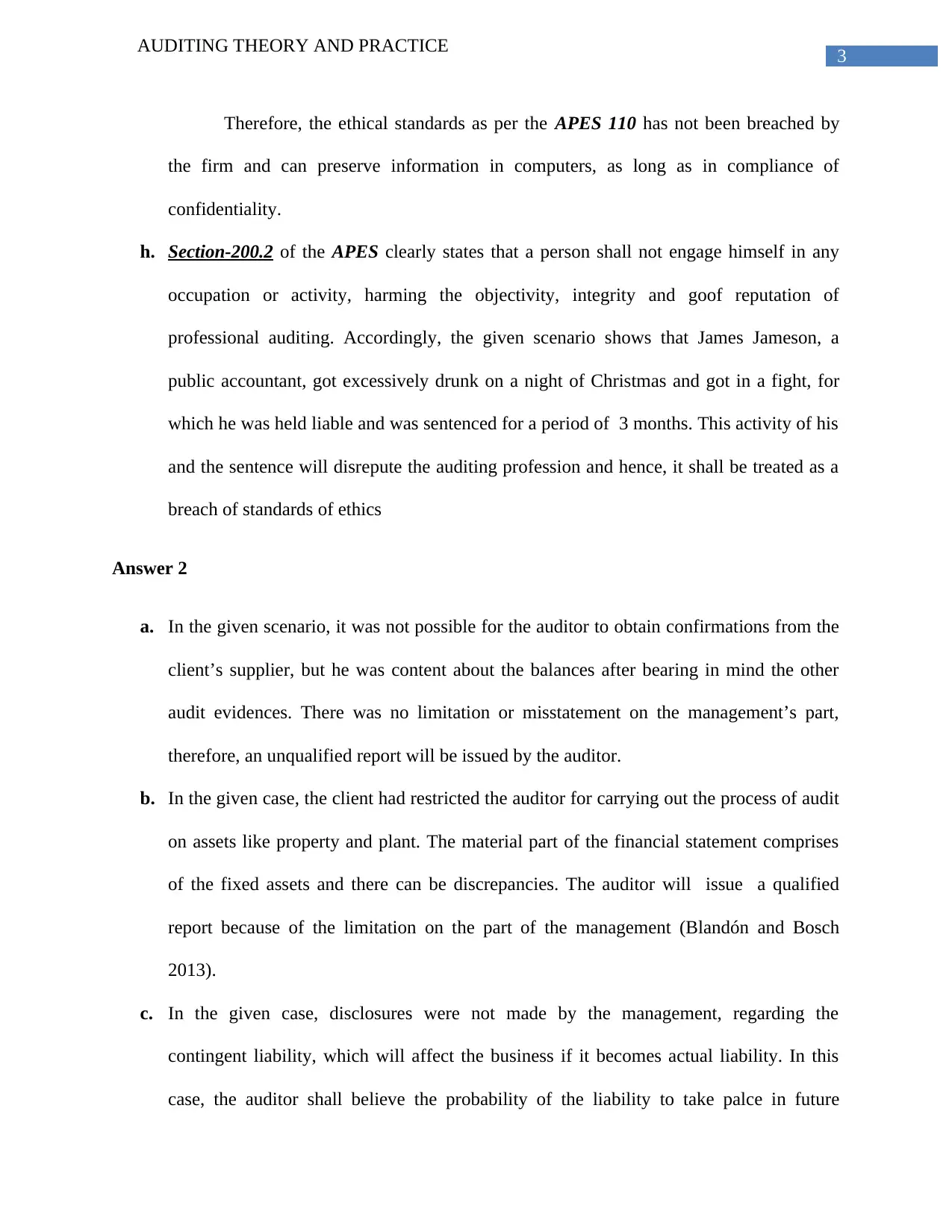
3
AUDITING THEORY AND PRACTICE
Therefore, the ethical standards as per the APES 110 has not been breached by
the firm and can preserve information in computers, as long as in compliance of
confidentiality.
h. Section-200.2 of the APES clearly states that a person shall not engage himself in any
occupation or activity, harming the objectivity, integrity and goof reputation of
professional auditing. Accordingly, the given scenario shows that James Jameson, a
public accountant, got excessively drunk on a night of Christmas and got in a fight, for
which he was held liable and was sentenced for a period of 3 months. This activity of his
and the sentence will disrepute the auditing profession and hence, it shall be treated as a
breach of standards of ethics
Answer 2
a. In the given scenario, it was not possible for the auditor to obtain confirmations from the
client’s supplier, but he was content about the balances after bearing in mind the other
audit evidences. There was no limitation or misstatement on the management’s part,
therefore, an unqualified report will be issued by the auditor.
b. In the given case, the client had restricted the auditor for carrying out the process of audit
on assets like property and plant. The material part of the financial statement comprises
of the fixed assets and there can be discrepancies. The auditor will issue a qualified
report because of the limitation on the part of the management (Blandón and Bosch
2013).
c. In the given case, disclosures were not made by the management, regarding the
contingent liability, which will affect the business if it becomes actual liability. In this
case, the auditor shall believe the probability of the liability to take palce in future
AUDITING THEORY AND PRACTICE
Therefore, the ethical standards as per the APES 110 has not been breached by
the firm and can preserve information in computers, as long as in compliance of
confidentiality.
h. Section-200.2 of the APES clearly states that a person shall not engage himself in any
occupation or activity, harming the objectivity, integrity and goof reputation of
professional auditing. Accordingly, the given scenario shows that James Jameson, a
public accountant, got excessively drunk on a night of Christmas and got in a fight, for
which he was held liable and was sentenced for a period of 3 months. This activity of his
and the sentence will disrepute the auditing profession and hence, it shall be treated as a
breach of standards of ethics
Answer 2
a. In the given scenario, it was not possible for the auditor to obtain confirmations from the
client’s supplier, but he was content about the balances after bearing in mind the other
audit evidences. There was no limitation or misstatement on the management’s part,
therefore, an unqualified report will be issued by the auditor.
b. In the given case, the client had restricted the auditor for carrying out the process of audit
on assets like property and plant. The material part of the financial statement comprises
of the fixed assets and there can be discrepancies. The auditor will issue a qualified
report because of the limitation on the part of the management (Blandón and Bosch
2013).
c. In the given case, disclosures were not made by the management, regarding the
contingent liability, which will affect the business if it becomes actual liability. In this
case, the auditor shall believe the probability of the liability to take palce in future
Paraphrase This Document
Need a fresh take? Get an instant paraphrase of this document with our AI Paraphraser
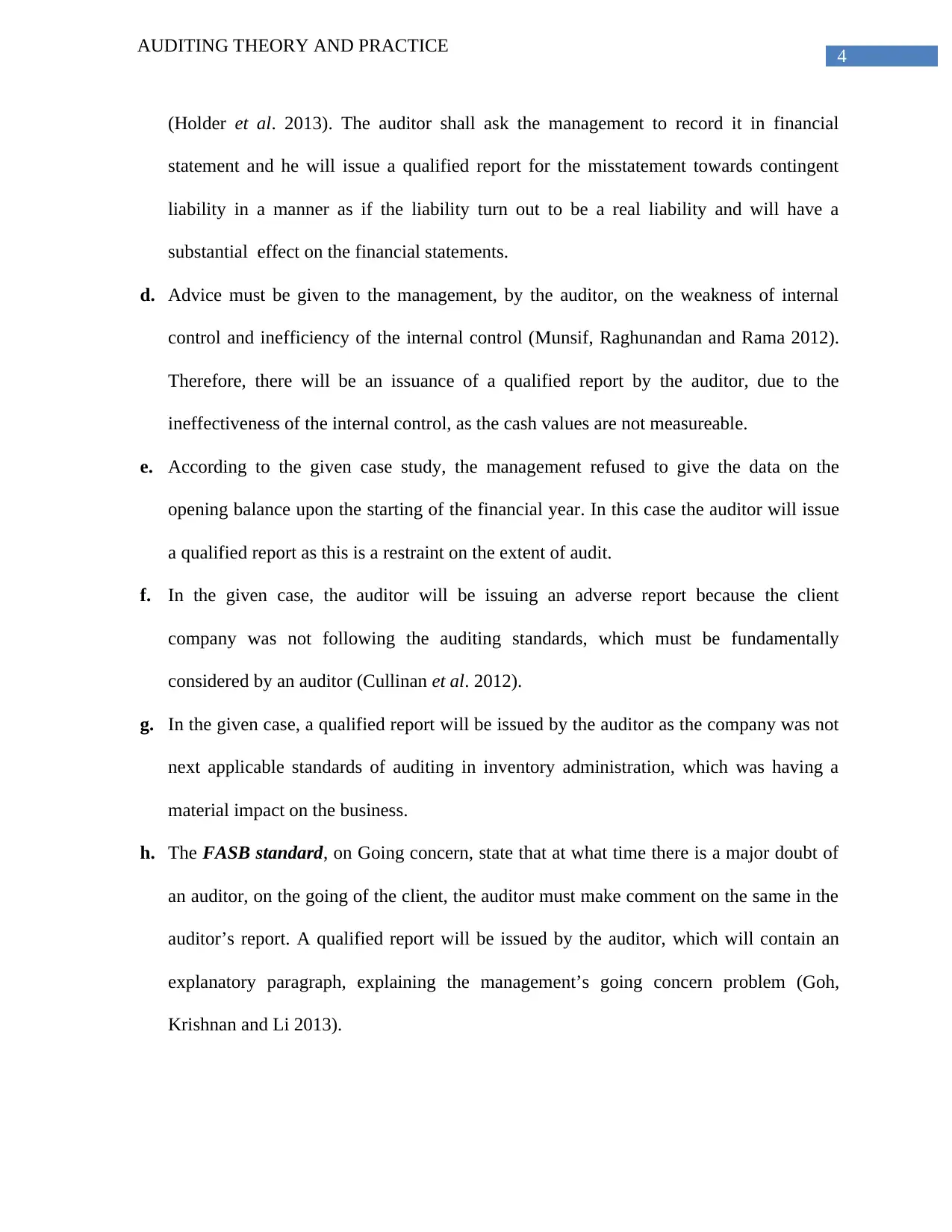
4
AUDITING THEORY AND PRACTICE
(Holder et al. 2013). The auditor shall ask the management to record it in financial
statement and he will issue a qualified report for the misstatement towards contingent
liability in a manner as if the liability turn out to be a real liability and will have a
substantial effect on the financial statements.
d. Advice must be given to the management, by the auditor, on the weakness of internal
control and inefficiency of the internal control (Munsif, Raghunandan and Rama 2012).
Therefore, there will be an issuance of a qualified report by the auditor, due to the
ineffectiveness of the internal control, as the cash values are not measureable.
e. According to the given case study, the management refused to give the data on the
opening balance upon the starting of the financial year. In this case the auditor will issue
a qualified report as this is a restraint on the extent of audit.
f. In the given case, the auditor will be issuing an adverse report because the client
company was not following the auditing standards, which must be fundamentally
considered by an auditor (Cullinan et al. 2012).
g. In the given case, a qualified report will be issued by the auditor as the company was not
next applicable standards of auditing in inventory administration, which was having a
material impact on the business.
h. The FASB standard, on Going concern, state that at what time there is a major doubt of
an auditor, on the going of the client, the auditor must make comment on the same in the
auditor’s report. A qualified report will be issued by the auditor, which will contain an
explanatory paragraph, explaining the management’s going concern problem (Goh,
Krishnan and Li 2013).
AUDITING THEORY AND PRACTICE
(Holder et al. 2013). The auditor shall ask the management to record it in financial
statement and he will issue a qualified report for the misstatement towards contingent
liability in a manner as if the liability turn out to be a real liability and will have a
substantial effect on the financial statements.
d. Advice must be given to the management, by the auditor, on the weakness of internal
control and inefficiency of the internal control (Munsif, Raghunandan and Rama 2012).
Therefore, there will be an issuance of a qualified report by the auditor, due to the
ineffectiveness of the internal control, as the cash values are not measureable.
e. According to the given case study, the management refused to give the data on the
opening balance upon the starting of the financial year. In this case the auditor will issue
a qualified report as this is a restraint on the extent of audit.
f. In the given case, the auditor will be issuing an adverse report because the client
company was not following the auditing standards, which must be fundamentally
considered by an auditor (Cullinan et al. 2012).
g. In the given case, a qualified report will be issued by the auditor as the company was not
next applicable standards of auditing in inventory administration, which was having a
material impact on the business.
h. The FASB standard, on Going concern, state that at what time there is a major doubt of
an auditor, on the going of the client, the auditor must make comment on the same in the
auditor’s report. A qualified report will be issued by the auditor, which will contain an
explanatory paragraph, explaining the management’s going concern problem (Goh,
Krishnan and Li 2013).
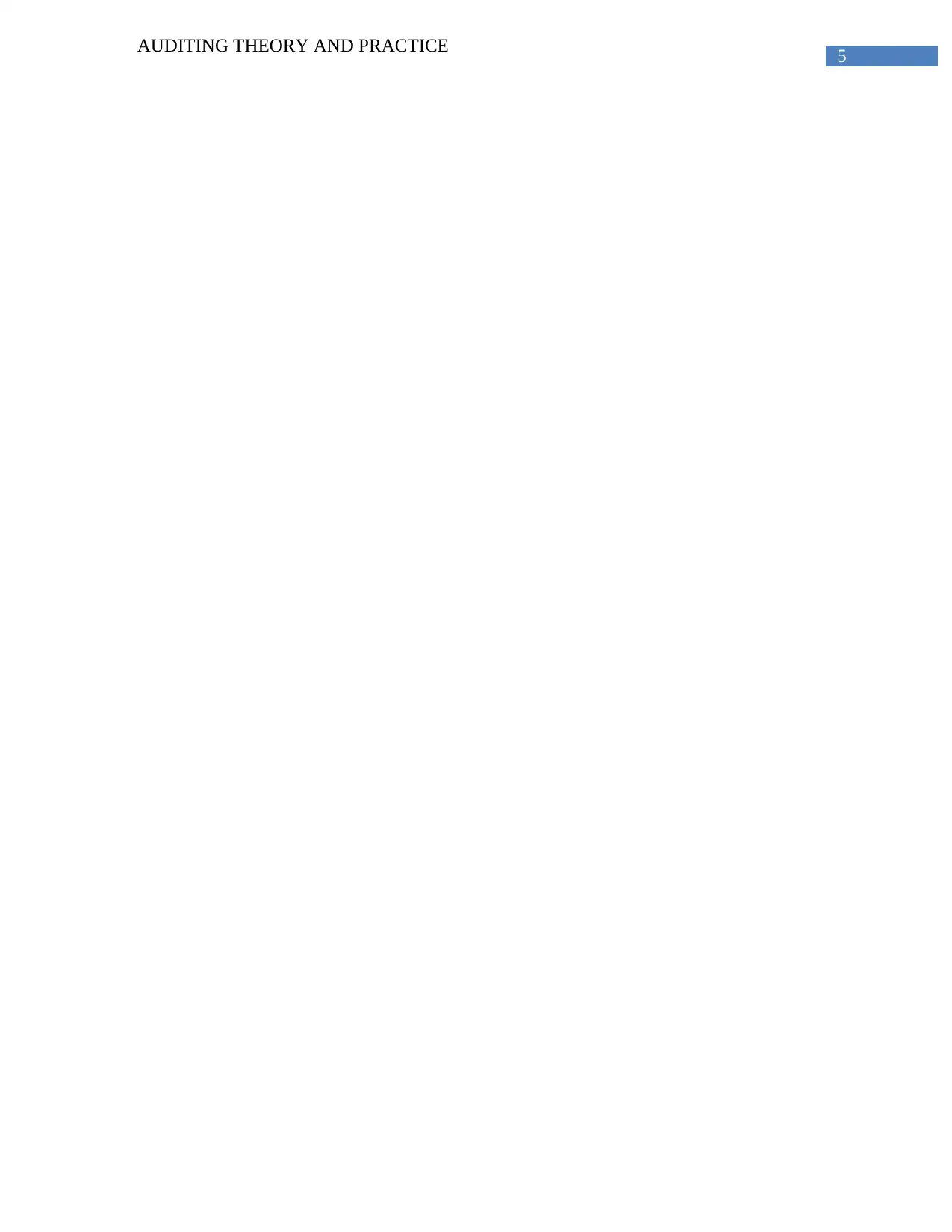
5
AUDITING THEORY AND PRACTICE
AUDITING THEORY AND PRACTICE
⊘ This is a preview!⊘
Do you want full access?
Subscribe today to unlock all pages.

Trusted by 1+ million students worldwide
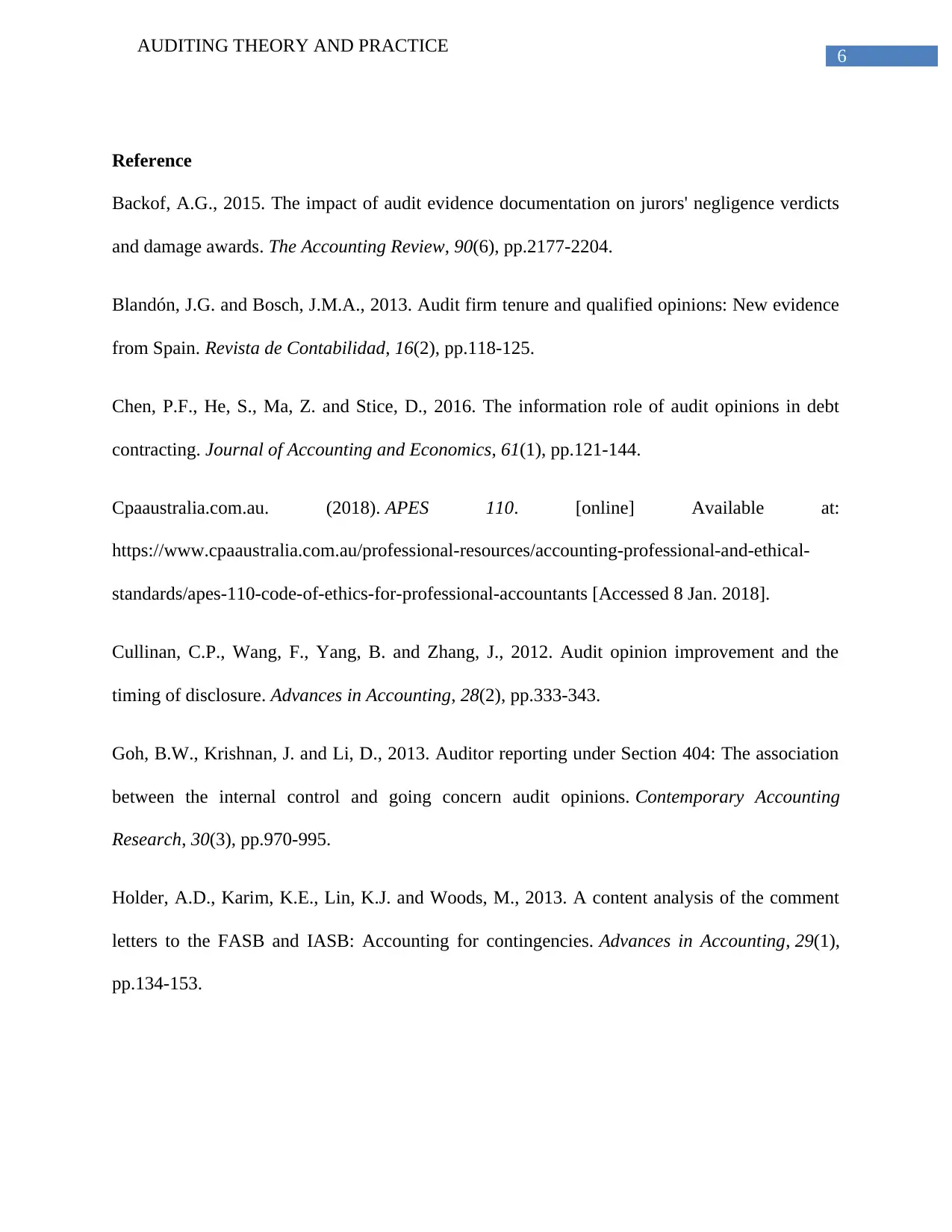
6
AUDITING THEORY AND PRACTICE
Reference
Backof, A.G., 2015. The impact of audit evidence documentation on jurors' negligence verdicts
and damage awards. The Accounting Review, 90(6), pp.2177-2204.
Blandón, J.G. and Bosch, J.M.A., 2013. Audit firm tenure and qualified opinions: New evidence
from Spain. Revista de Contabilidad, 16(2), pp.118-125.
Chen, P.F., He, S., Ma, Z. and Stice, D., 2016. The information role of audit opinions in debt
contracting. Journal of Accounting and Economics, 61(1), pp.121-144.
Cpaaustralia.com.au. (2018). APES 110. [online] Available at:
https://www.cpaaustralia.com.au/professional-resources/accounting-professional-and-ethical-
standards/apes-110-code-of-ethics-for-professional-accountants [Accessed 8 Jan. 2018].
Cullinan, C.P., Wang, F., Yang, B. and Zhang, J., 2012. Audit opinion improvement and the
timing of disclosure. Advances in Accounting, 28(2), pp.333-343.
Goh, B.W., Krishnan, J. and Li, D., 2013. Auditor reporting under Section 404: The association
between the internal control and going concern audit opinions. Contemporary Accounting
Research, 30(3), pp.970-995.
Holder, A.D., Karim, K.E., Lin, K.J. and Woods, M., 2013. A content analysis of the comment
letters to the FASB and IASB: Accounting for contingencies. Advances in Accounting, 29(1),
pp.134-153.
AUDITING THEORY AND PRACTICE
Reference
Backof, A.G., 2015. The impact of audit evidence documentation on jurors' negligence verdicts
and damage awards. The Accounting Review, 90(6), pp.2177-2204.
Blandón, J.G. and Bosch, J.M.A., 2013. Audit firm tenure and qualified opinions: New evidence
from Spain. Revista de Contabilidad, 16(2), pp.118-125.
Chen, P.F., He, S., Ma, Z. and Stice, D., 2016. The information role of audit opinions in debt
contracting. Journal of Accounting and Economics, 61(1), pp.121-144.
Cpaaustralia.com.au. (2018). APES 110. [online] Available at:
https://www.cpaaustralia.com.au/professional-resources/accounting-professional-and-ethical-
standards/apes-110-code-of-ethics-for-professional-accountants [Accessed 8 Jan. 2018].
Cullinan, C.P., Wang, F., Yang, B. and Zhang, J., 2012. Audit opinion improvement and the
timing of disclosure. Advances in Accounting, 28(2), pp.333-343.
Goh, B.W., Krishnan, J. and Li, D., 2013. Auditor reporting under Section 404: The association
between the internal control and going concern audit opinions. Contemporary Accounting
Research, 30(3), pp.970-995.
Holder, A.D., Karim, K.E., Lin, K.J. and Woods, M., 2013. A content analysis of the comment
letters to the FASB and IASB: Accounting for contingencies. Advances in Accounting, 29(1),
pp.134-153.
Paraphrase This Document
Need a fresh take? Get an instant paraphrase of this document with our AI Paraphraser
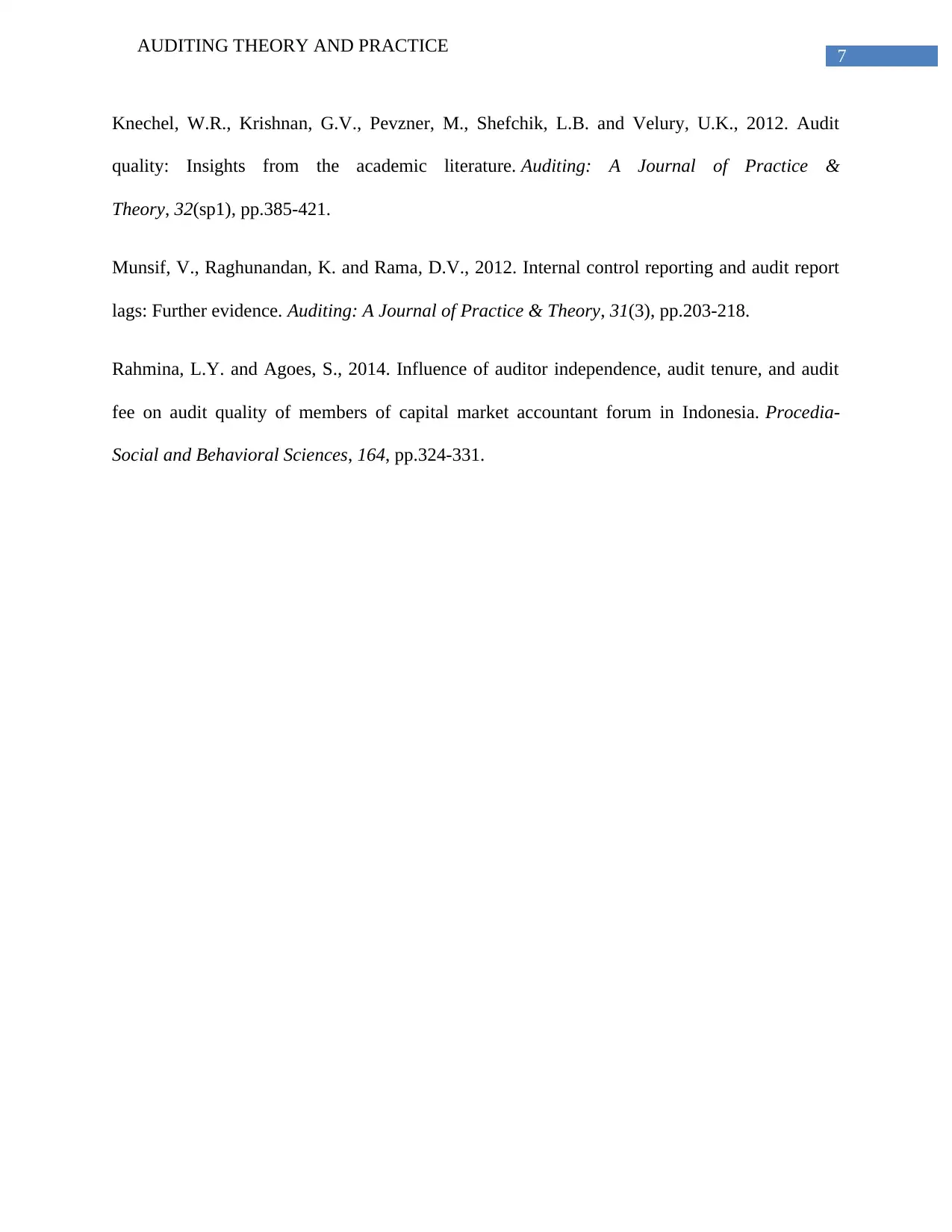
7
AUDITING THEORY AND PRACTICE
Knechel, W.R., Krishnan, G.V., Pevzner, M., Shefchik, L.B. and Velury, U.K., 2012. Audit
quality: Insights from the academic literature. Auditing: A Journal of Practice &
Theory, 32(sp1), pp.385-421.
Munsif, V., Raghunandan, K. and Rama, D.V., 2012. Internal control reporting and audit report
lags: Further evidence. Auditing: A Journal of Practice & Theory, 31(3), pp.203-218.
Rahmina, L.Y. and Agoes, S., 2014. Influence of auditor independence, audit tenure, and audit
fee on audit quality of members of capital market accountant forum in Indonesia. Procedia-
Social and Behavioral Sciences, 164, pp.324-331.
AUDITING THEORY AND PRACTICE
Knechel, W.R., Krishnan, G.V., Pevzner, M., Shefchik, L.B. and Velury, U.K., 2012. Audit
quality: Insights from the academic literature. Auditing: A Journal of Practice &
Theory, 32(sp1), pp.385-421.
Munsif, V., Raghunandan, K. and Rama, D.V., 2012. Internal control reporting and audit report
lags: Further evidence. Auditing: A Journal of Practice & Theory, 31(3), pp.203-218.
Rahmina, L.Y. and Agoes, S., 2014. Influence of auditor independence, audit tenure, and audit
fee on audit quality of members of capital market accountant forum in Indonesia. Procedia-
Social and Behavioral Sciences, 164, pp.324-331.
1 out of 8
Related Documents
Your All-in-One AI-Powered Toolkit for Academic Success.
+13062052269
info@desklib.com
Available 24*7 on WhatsApp / Email
![[object Object]](/_next/static/media/star-bottom.7253800d.svg)
Unlock your academic potential
Copyright © 2020–2026 A2Z Services. All Rights Reserved. Developed and managed by ZUCOL.





